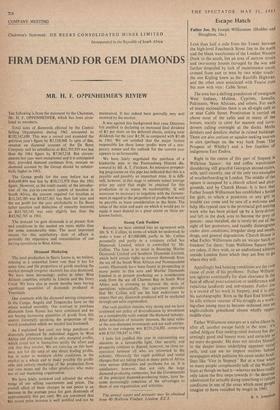Escape Hatch
LESS than half a mile from the Tower, between the high-level Fenchurch Street line to the north and the blank warehouses of the London Western Dock to the south, lies an area of narrow streets and two-storey houses (savaged by the war and further despoiled by lack of maintenance since), crossed from east to west by two wider roads: the one Kipling knew as the Ratcliffe Highway, and the other once associated with Fascist riots but now with vice: Cable Street.
The area has a shifting population of immigrant West Indians, Maltese, Cypriots, Somalis, Pakistanis, West Africans, and others. For each of many nationalities there is an all-night café in or near Cable Street. Prostitution is carried on above most of the cafés and in many of the houses, mainly to cater for seamen and lorry-
drivers calling overnight at the docks. Meths drinkers and derelicts shelter in ruined buildings.
There are also curious or squalor-seeking tourists in cars (perhaps on the way back from 'The Prospect of Whitby') and a few families of indigenous East Enders.
Right in the centre of this part of Stepney is Wellclose Square : tea and coffee warehouses shouldering still graceful Georgian second-raters. with, until recently, one of the only two examples of weatherboarding in London. The middle of the square is occupied by a church school and play- grounds, and by Church House. It is here that Father Joseph Williamson has established a hostel for girls, to which a prostitute or any girl in trouble can come and be sure of a welcome and help. His typical case is the provincial girl seeking work who has been picked up by a lorry-driver and left in the dock area to become the prey of ponces : once installed, she is rarely let out of the sight of her protectors, and rapidly disintegrates under slum conditions, irregular sleep and meals, drugs, and general degradation. Church House is what Father Williamson calls an 'escape hatch to freedom' for them : from Wellclose Square they are taken, if they wish, to an undisclosed address outside London from which they are free to go where they will.
Appallingly bad housing conditions are the root cause of most of his problems : Father William• son agitates continually for slum clearance in the face of official procrastination or indifference and rapacious landlords and sub-tenants. Father Joe is a record of his work in Stepney, and it is also his autobiography. Born in the East End himself, he tells without rancour of his struggle as a work- ing-class young man to become ordained into an anglo-catholic priesthood almost wholly upper- middle-class.
Father Williamson emerges as a naive (there is, after all, another escape hatch in the area : it's called Aldgate East underground station) but dis- armingly good and honest man; and certainly as no mere do-gooder. He does not involve himself in the deeper issues underlying apparent social evils, and can see no impure motives behind newspapers which publicise his cause under head- lines like 'Vice in Stepney.' But at a time when so many people complacently talk of the Welfare State as though we had it—whereas we have reallY only taken the first steps towards it—he deserves admiration for actually doing something to relieve conditions in one of the areas which most people imagine to have vanished by magic in 1945.
B. S. .101INSOr4


































 Previous page
Previous page